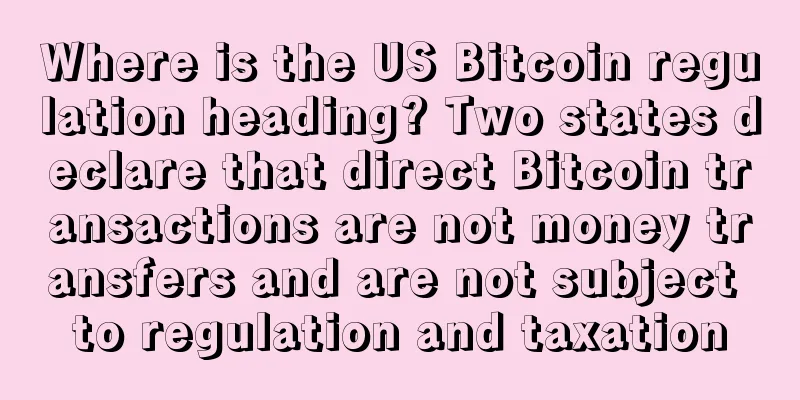Where is the US Bitcoin regulation heading? Two states declare that direct Bitcoin transactions are not money transfers and are not subject to regulation and taxation

|
Financial regulation of Bitcoin and other cryptocurrencies is changing in some parts of the United States. Texas and Illinois recently announced that direct Bitcoin transactions are not subject to money transmission regulations, which means that Bitcoin is not subject to taxation, regulation and KYC policy requirements. At the same time that the IRS has asked the Bitcoin exchange Coinbase to provide it with user information for Bitcoin tax research, it seems that the issue of Bitcoin taxation in the United States is complicated. Marco Santori, a bitcoin expert and head of the financial technology practice at law firm Cooley LLP, revealed that Illinois has formally proposed new bitcoin guidelines and is seeking feedback from various bitcoin experts, cryptocurrency professionals and law firms. In the proposed new guidelines, Illinois noted that while exchanges are money transmitters and are required to hold fiat currency to provide to buyers, selling or buying Bitcoin directly is not money transmission. The guidelines also state that crypto-to-crypto trading is not money transmission. Therefore, in Texas and Illinois, platforms like Shapeshift will not be included in the money transmission regulatory framework. Given that the money transmitter regulatory framework only applies to organizations that hold custody of user funds, either Bitcoin or fiat currency, a decentralized exchange like Bitsquare would not be considered for KYC policies or money transmitter regulations. Earlier this year, peer-to-peer exchange Bitsquare introduced bitcoin-fiat currency trading pairs, offering an alternative to traditional bitcoin exchanges for users concerned about KYC policies and strict regulatory requirements. Under the regulatory frameworks of Texas and Illinois, peer-to-peer Bitcoin exchange platform LocalBitcoins is also not subject to money transmission regulations, and users can freely trade between Bitcoin and fiat currencies without regulation. However, Santori noted that buying and selling bitcoin through bitcoin kiosks and bitcoin teller machines (BTMs) are still regulated because they are connected to the back end of bitcoin exchanges. And, because bitcoin kiosks and BTMs hold custody of the fiat currency provided to the seller, they still fall under the scope of money transmission regulation. Currently, Bitcoin and cryptocurrency transactions are still considered money transmission by the Uniform Money Services Act (UMSA), regardless of whether there is an intermediary or third-party institution transmitter. Therefore, based on the basic regulatory framework established in Washington, most states in the United States still treat Bitcoin-fiat currency transactions as a form of money transmission. As Bitcoin continues to increase its market capitalization, develop an international user base, establish itself as a global digital currency, and regulators continue to learn about the cryptocurrency space, more and more states and countries will begin to pass workable and practical regulations, just like Texas and Illinois have done. |
<<: Ethereum (ETH) price continues to plummet, and is about to face a major test
Recommend
Binance and Coinbase: What’s Next, Experts Explain
The U.S. Securities and Exchange Commission ( SEC...
What does a mole on a woman’s back mean? Is it good for a woman to have a mole on her back?
Some moles tend to grow in places that are not ea...
A brief analysis of the physiognomy of peach blossom eyes: Is the physiognomy of peach blossom eyes good or bad?
In my country's traditional culture, peach bl...
Foge teaches you the criteria for choosing a husband based on face reading
Foge teaches you the criteria for choosing a husb...
Judging from palmistry whether a woman can successfully marry into a wealthy family
In fact, every woman has a beautiful dream, which...
A detailed introduction to the facial features of a woman who will achieve great things
From the perspective of physiognomy, a woman with...
The man who understands women's hearts best
The man who understands women's hearts best I...
How to tell a man's fate by looking at his lips
By looking at the thickness of people's lips,...
What does it mean to have nasolabial folds?
People with early nasolabial lines People's n...
How to know the disease by looking at the palm lines
Many people know that palmistry can predict futur...
What does a mole on the bridge of the nose mean? Do women with moles on the bridge of their noses have more bad luck in love?
Moles on people's faces are not just there fo...
What does a big triangle in the middle of your palm represent?
Some people have triangles on their hands, some p...
Auxiliary lines in the palm: lines of resistance
Auxiliary lines in the palm: lines of resistance ...
These women have moles on their mouths after getting married regardless of their family
It is very important to take good care of your fa...
Moles on men's faces: Mole positions of philandering men
Moles on men's faces: Mole positions of phila...









